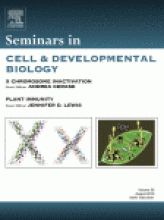In Portland, Maël Baudin presented a poster on the biochemical characterization of plant immune complexes, and he also received a travel award to attend the meeting. Karl Schreiber's poster focused on an uncharacterized gene that contributes to the immune response against HopZ1a, and Jenn's poster focused on the high-throughput yeast two-hybrid screen their group has used to identify plant proteins that interact with the ZAR1 immune receptor.
The review article
Schreiber, KJ, Baudin, M, Hassan, JA, and Lewis, JD (2016). Die another day: Molecular mechanisms of effector-triggered immunity elicited by type III secreted effector proteins. Seminars in Cell & Developmental Biology, 56:124-133.
Abstract:
Bacterial pathogens inject type III secreted effector (T3SE) proteins into their hosts where they display dual roles depending on the host genotype. T3SEs promote bacterial virulence in susceptible hosts, and elicit immunity in resistant hosts. T3SEs are typically recognized when they modify a host target that is associated with a NOD-like receptor protein. We focus on the molecular mechanisms of T3SE recognition in plants. Plants guard multiple nodes of the immune signaling pathway, from recognition at the cell surface by receptor-like kinases to nuclear signaling. Some nodes are bacterial virulence targets, while other nodes are decoys that resemble true virulence targets.

